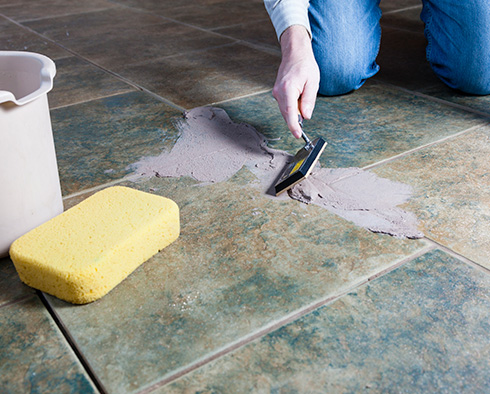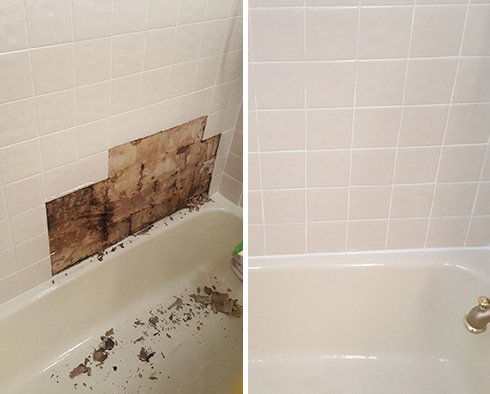Is Bleach Bad for Grout?
June 28, 2024
For many people, bleach is a go-to product for all types of cleaning.
There's a pretty good reason for this. Bleach has been around and used as a cleaner for many decades, and the truth is, bleach can be an effective way to clean and disinfect.
Bleach disinfects because the active ingredient is sodium hypochlorite, which will alter and remove proteins in micro-organisms. This makes bleach effective for killing a multitude of bacteria, fungus, and viruses.
You'll find countless DIY articles that suggest using bleach for cleaning and sanitizing, but you'll also see it suggested as a way of whitening tile grout, removing stains, etc. While you can effectively use bleach for these reasons, are there any reasons why you might want to avoid using bleach?
Is Bleach Bad for Grout?
You may be wondering if you can use bleach to clean your tile grout. The short answer is yes if you are very careful. However, there are some things to consider that may make using bleach to clean your tile's grout a bad idea.
First, bleach can discolor or even strip color away. Using bleach to clean your colored grout can result in fading of the color, making it uneven, or even removing the cover if the bleach isn't handled properly.
Using bleach on colored grout should really be avoided. Bleach can also weaken the grout, causing it to crack and crumble.
If any of the issues mentioned here were to occur, it would be necessary to completely replace the grout. That's a cost that can be avoided by not using bleach on grout.
Besides being bad for grout, bleach has some health issues associated with it that may make it better not to use. A lot of commercial establishments and homeowners alike automatically use bleach in their cleaning routines with absolutely no concern for the health risks often associated with the product. If ingested, bleach can be toxic.

According to the Environmental Protection Agency (EPA), chlorine emits fumes even after some time has passed.
The EPA suggests that over time these fumes can produce health issues for employees who work around them and even children who are constantly in environments where bleach has been used.
The EPA further states that many people who are regularly exposed to bleach can be more likely to have a respiratory impairment or even illness. There are studies that even link bleach to a higher instance of asthma and allergies.
Also, exposure to bleach may cause burning of the eyes, nose, and throat. For these health reasons alone, using bleach may not be the best option for cleaning.
Are There Better Options for Cleaning Grout?
Although we've established that bleach does clean and disinfect, we've concluded that it might not be the best choice for a few reasons. Your grout still needs to be cleaned and maintained, so what are the alternatives?Sir Grout Brooklyn technicians always explain to their clients which are the best cleaners to use for tile and grout and how to avoid cleaners that can damage the grout.

Sir Grout experts recommend staying away from harsh acidic cleaners. It's better to use pH-neutral soap-free cleaners like Sir Grout's Natural Hard Surface Cleaner.
We also advise using this type of cleaner weekly. Finally, we suggest keeping all surfaces dry and wiping away any moisture with a terrycloth, squeegee or even a towel.
Sir Grout techs recommend staying away from abrasive cleaning products as well. This is particularly important if the grout is cement-based and hasn't been sealed properly.
Cement grout is porous and absorbs liquids and other substances that can quickly make the grout look dirty and worn. Sir Grout products are also safe for people and pets.
Our natural cleaner is even enhanced with an ingredient that can help inhibit the growth of bacteria, fungi, mold, and other microorganisms. Here is a complete guide for more information and tips on How to Clean Grout.

Finally, have in mind that excessive scrubbing can damage your grout. The best way to avoid dirt buildup and fungi growth is to have your grout sealed. Properly sealed grout lines are easy to clean so excessive scrubbing won't be necessary and they are also resistant to water, spills, stains and fungi growth.
If you don't know if your grout is sealed or whether your grout's sealer is in good condition you should place a few drops of water on the grout. If the water seeps in, the grout must be resealed.


When you're looking for grout cleaning and hard surface restoration, Sir Grout Brooklyn is the best choice. Whether you need your tile and grout cleaned and sealed or a stone restoration job, Sir Grout Brooklyn can help you.
With locations throughout the U.S., Sir Grout Brooklyn has developed a solid reputation for quality and great customer care. Call us at (718) 673-6362 or click on the "Schedule a Free Quote" button on our page to ask about your free quote or to find a Sir Grout Brooklyn near you.









